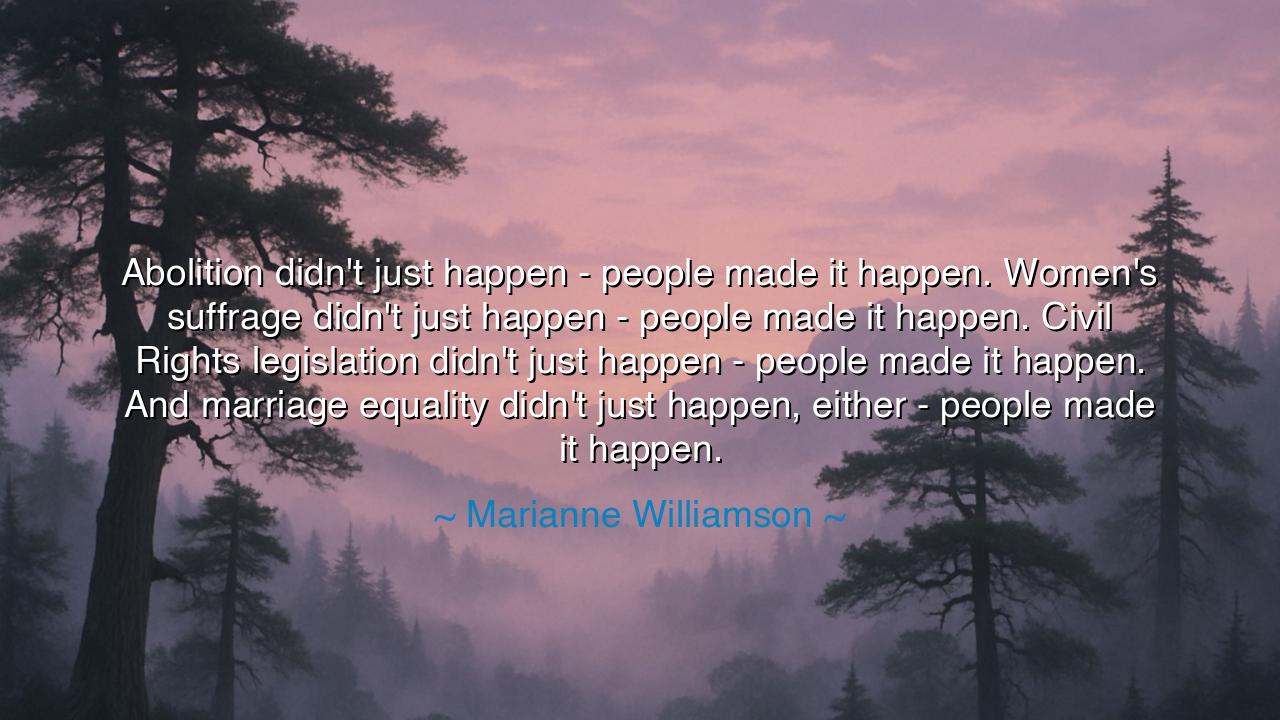
Abolition didn't just happen - people made it happen. Women's
Abolition didn't just happen - people made it happen. Women's suffrage didn't just happen - people made it happen. Civil Rights legislation didn't just happen - people made it happen. And marriage equality didn't just happen, either - people made it happen.






In the grand tapestry of history, there are moments when the cry for justice rises so fiercely that it shakes the very foundations of society. The words of Marianne Williamson—"Abolition didn't just happen – people made it happen. Women's suffrage didn't just happen – people made it happen. Civil Rights legislation didn't just happen – people made it happen. And marriage equality didn't just happen, either – people made it happen"—speak to the timeless truth that change is not a passive occurrence. It is a force, a movement driven by the collective will of the people. Justice, true justice, is not something that simply materializes in the world; it is fought for, shaped by courageous individuals who dare to stand against the prevailing tides of oppression.
Let us turn back to the days of slavery, when men and women of moral conviction stood in the face of overwhelming power and demanded the freedom of those bound in chains. Frederick Douglass, born into slavery, became a beacon of hope, his voice carrying the truth of the horrors of human bondage to the ears of the world. His words, like a sword, cut through the comfortable lies of society, revealing the profound injustice of slavery. Douglass, along with countless others like Harriet Tubman and Sojourner Truth, fought with unrelenting determination for the freedom that should have been every human's birthright. Abolition did not happen by chance. It happened because these individuals dared to act, to speak, and to lead others in the fight for justice.
Similarly, the fight for women's suffrage was not born from the whims of time or the charity of a few benevolent leaders—it was born of sacrifice and struggle. The early suffragists, such as Susan B. Anthony and Elizabeth Cady Stanton, faced fierce opposition, ridicule, and even imprisonment. They understood that the right to vote was not a gift that would be handed to them; it was a battle that would require their strength and resilience. These women, and the countless others who followed, were determined to reshape a world where the voices of women were silenced. Their persistence in the face of adversity is the reason that women, in many parts of the world, now have the right to cast their votes and be heard.
The Civil Rights movement of the 1960s stands as another testament to the power of people who decided that justice would not wait. The reverberations of Martin Luther King Jr.'s speeches still echo through the annals of time, his call for equality and peaceful resistance lighting the way for millions. Yet, behind King’s speeches were the countless acts of courage from ordinary men and women—Rosa Parks, who refused to give up her seat on a bus, and the brave students who walked across the Edmund Pettus Bridge in Selma. These individuals did not wait for change to come; they created it, standing firm in the belief that all men are created equal. Civil Rights legislation was not a gift bestowed by a benevolent government; it was the result of years of struggle, sacrifice, and the unwavering belief in the dignity of every human being.
The struggle for marriage equality, much like these earlier battles, was not an issue that emerged from nowhere. Love, once constrained by the narrow definitions of tradition, expanded in the hearts of those who believed in the freedom to love whomever they chose. The fight for same-sex marriage was a battle against centuries of discrimination, and it was led by those who refused to accept that love could be defined by anything but the freedom of the heart. Leaders like Ellen DeGeneres, Harvey Milk, and countless activists took a stand, demanding that the government and society recognize the rights of all people to marry and build families. The victory of marriage equality was not inevitable—it was made possible by the relentless advocacy, courage, and love of those who believed in the fundamental right to love freely.
The lesson here is simple yet profound: justice and equality are not handed down from on high. They are forged in the fires of human struggle, conviction, and action. Every advance in human rights, whether it be the abolition of slavery, the right of women to vote, or the recognition of marriage equality, is the result of the decisions and actions of people who refuse to accept the status quo. These victories did not simply "happen"; they were earned through hard-fought battles by those willing to stand for what is right, to sacrifice, and to lead others toward a more just world.
In your own life, take this wisdom to heart: change does not happen on its own. If you desire a world of equality and justice, you must be the one to make it happen. Stand for those who cannot stand for themselves, speak for those whose voices are stifled, and act when silence would be easier. Whether you are fighting for racial equality, gender equality, LGBTQ+ rights, or any other cause, know that you are part of a long line of heroes—people who dared to dream, dared to fight, and dared to create a world of justice for all. The power to shape the future is in your hands, and the choice to act is yours.






AAdministratorAdministrator
Welcome, honored guests. Please leave a comment, we will respond soon